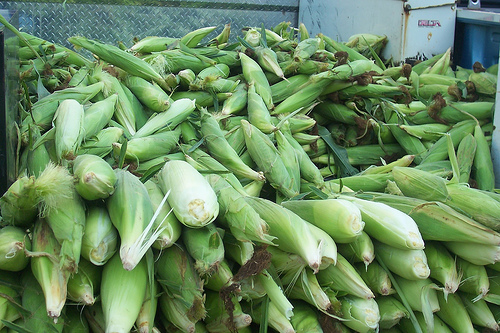Corn farmers have pressed government to issue policies harmonious to Executive Order 430 that upholds trials of genetically modified (GM) crops as these contribute to climate change mitigation and to food security with its cumulative $98 billion value.

In a resolution during the National Corn Congress, the Philippine Maize Federation Inc. (PMFI) has asked President Benigno S. Aquino III to support the regulatory process administered by the National Committee on Biosafety of the Philippines (NCBP).
Executive Order (EO) 430 created NCBP which regulates field trials of GM crops.
Among the crops they are petitioning to be allowed to be put on continued field trial are the Bacillus thuringiensis (Bt) eggplant and Golden Rice.
Bt eggplant holds promise of eliminating persistent use of chemical spray on eggplant, bringing better health to farmers and consumers. Farmers’ spraying practice on eggplant reaches to 25 to 80 times during a 120-170 day eggplant growing season.
Golden Rice is a proVitamin A-rich rice that has the potential to spare 230 million children globally from Vitamin A-deficiency. The World Health Organization indicates there are one million children dying from Vitamin A deficiency-related illnesses.
“From 1996 to 2011, biotechnology (GM) crops contributed to food security and climate change mitigation by increasing crop production value by $98.2 billion. It has provided a better environment by saving 473 million kilos in active ingredients of synthetic chemical pesticides,” according to PMFI.
The Court of Appeals issued last September a decision affirming its writ of kalikasan on Bt eggplant which stopped the crop’s field trial and commercial development.
GM crops reduced carbon dioxide (CO2) emissions by 23.1 billion kilos in 2011 alone, said the corn farmers in the resolution signed by PMFI President Roger Navarro, among others.
The government should support use of GM crops in its aim to achieve Millennium Development Goals particularly in lowering the number of hungry people.
PMFI said it defends the interest of corn farmers planting Bt corn and would like to share the benefits of planting GM crops with other farmers, specifically those planting eggplant.
The GM Bt corn is now planted on 730,000 hectares in the country, catapulting Filipino corn farmers to become exporters.
The National Food Authority (NFA) Council is now hearing recommendation for the export of 100,000 metric tons (MT) of corn grains. The export is expected before the end of the year.
Corn farmers from Ploughshares Inc. so far exported to South Korea more than 400 MT of corn silage. These are largely Bt corn that are hardly touched by the pest corn borer and thus come out clean and desired by South Korean livestock raisers.
“Biotech corn has enabled the country to become self-sufficient in this very important staple and to be a net exporter since 2012, with South Korea and later Malaysia as market for our better appreciated biotech corn due to the clean and undamaged corn cobs,” said PMFI.
The Food and Drug Administration (FDA) has already declared the safety of GM food products.
“The Philippine government, through the FDA, reiterated that all GM food products in the market have passed safety assessment based on UN FAO/WHO CODEX Alimentarius risk analysis. These have met international food safety standards and are as safe as and as nutritious as the food derived from conventional crops,” said PMFI.
GM crops have been found globally to be safe in all of 15 years of use as feed and food.
PMFI noted there has been a100-fold increase in GM crop area from 1.7 million hectares in 1996 to 170 million hectares in 2012 as farmers took advantage of planting benefits.
A total of 17.3 million farmers planted GM crops in 2012 of which over 15 million were small resource-poor farmers in developing countries.
Cumulative benefit from GM planting in developing countries from 1996 to 2011 was $49.6 billion. It was higher than those in developed countries which was at $48.6 billion.
A total of 28 countries planted GM crops in 2012, of which 20 were developing and 8 were developed. “More than half the world’s population or about 4 billion people live in the 28 countries planting biotech crops.”
As GM crops raise yield by 25 percent, less land is now used for farming, sparing land for flora and fauna habitat enrichment. Biodiversity is saved in an equivalent of 108.7 million hectares of land that was no longer used farming due to GM crops’ higher yield.
GM crops contributed to CO2 emission reduction, effectively removing10.2 million cars from the roads.
Other product development that government should support in order to add value to the country’s agricultural production are rice, papaya, sweet potato, cotton, and abaca. This could “contribute to food and fiber security and would increase productivity and income to alleviate hunger and rural poverty.”
EO 430 made Philippines the first South East Asian country to issue a regulatory system on GM crops. This was further supported by Administrative Order (AO) No. 8 of 2002 and EO 514 of 2006.
AO 8 provides for guidelines on the release to the environment of plants derived from biotechnology crops. EO 514 established a biosafety framework that observes strict scientific standards and international best practices on biotechnology crops production.
###
For any questions or interview requests, please contact 0921-338-3816.
